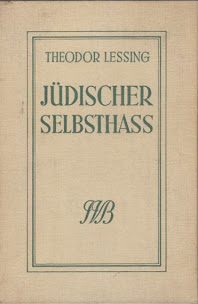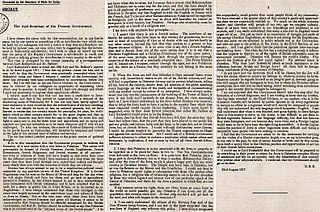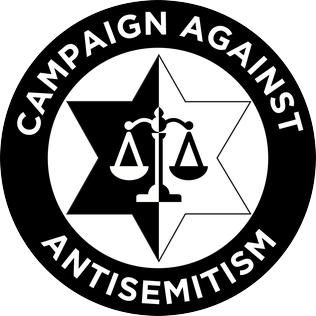Related Research Articles
Antisemitism is hostility to, prejudice towards, or discrimination against Jews. This sentiment is a form of racism, and a person who harbours it is called an antisemite. Though antisemitism is overwhelmingly perpetrated by non-Jews, it may occasionally be perpetrated by Jews in a phenomenon known as auto-antisemitism. Primarily, antisemitic tendencies may be motivated by negative sentiment towards Jews as a people or by negative sentiment towards Jews with regard to Judaism. In the former case, usually presented as racial antisemitism, a person's hostility is driven by the belief that Jews constitute a distinct race with inherent traits or characteristics that are repulsive or inferior to the preferred traits or characteristics within that person's society. In the latter case, known as religious antisemitism, a person's hostility is driven by their religion's perception of Jews and Judaism, typically encompassing doctrines of supersession that expect or demand Jews to turn away from Judaism and submit to the religion presenting itself as Judaism's successor faith—this is a common theme within the other Abrahamic religions. The development of racial and religious antisemitism has historically been encouraged by anti-Judaism, though the concept itself is distinct from antisemitism.

The Zionist occupation government, Zionist occupational government or Zionist-occupied government (ZOG), sometimes also referred to as the Jewish occupational government (JOG), is an antisemitic conspiracy theory claiming Jews secretly control the governments of Western states. It is a contemporary variation on the centuries-old belief in an international Jewish conspiracy. According to believers, a secret Zionist organization is actively controlling international banks, and through them governments, in order to collude against white, Christian, or Islamic interests.
New antisemitism is the concept that a new form of antisemitism which developed in the late 20th and early 21st centuries, tends to manifest itself as anti-Zionism and criticism of the Israeli government. The concept is included in some definitions of antisemitism, such as the working definition of antisemitism and the 3D test of antisemitism. The concept dates to the early 1970s, although the identification of anti-Zionism with antisemitism has "long been de rigueur in Jewish communal and broader pro-Israel circles".

The terms "self-hating Jew" and "self-loathing Jew" are used to describe a Jew whose viewpoints on any specific matter are perceived as antisemitic. This phenomenon is also known as auto-antisemitism. Recognition of the concept gained widespread currency after German-Jewish philosopher Theodor Lessing published his 1930 book Der jüdische Selbsthaß, which sought to explain a perceived inclination among Jewish intellectuals towards inciting antisemitism by stating their views about Judaism. More recently, this spotlight on antisemitism motivated by self-hatred within the Jewish diaspora is said to have become "something of a key term of opprobrium in and beyond Cold War–era debates about Zionism" in light of how some Jews may despise their entire identity due to their perception of the Arab–Israeli conflict.
The Jewish lobby are individuals and groups predominantly in the Jewish diaspora that advocates for the interests of Jews and Jewish values. The lobby references the involvement and influence of Jews in politics and the political process, and includes organized groups such as the American Jewish Committee, the American Israel Public Affairs Committee, B'nai B'rith, and the Anti-Defamation League. While there is overlap in membership between the Jewish lobby and the Israel lobby, the two terms are not interchangeable, as the Jewish lobby is defined by its ethnic makeup, while the Israel lobby is defined by its political agenda.

Different opinions exist among historians regarding the extent of antisemitism in American history and how American antisemitism contrasted with its European counterpart. Earlier students of American Jewish life minimized the presence of antisemitism in the United States, which they considered a late and alien phenomenon that arose on the American scene in the late 19th century. More recently however, scholars have asserted that no period in American Jewish history was free from antisemitism. The debate about the significance of antisemitism during different periods of American history has continued to the present day.

Anti-Zionism is opposition to Zionism. Although anti-Zionism is a heterogeneous phenomenon, all its proponents agree that the creation of the modern State of Israel, and the movement to create a sovereign Jewish state in the region of Palestine—the biblical Land of Israel—was flawed or unjust in some way.
Antony Lerman is a British writer who specialises in the study of antisemitism, the Israeli–Palestinian conflict, multiculturalism, and the place of religion in society. From 2006 to early 2009, he was Director of the Institute for Jewish Policy Research, a think tank on issues affecting Jewish communities in Europe. From December 1999 to 2006, he was Chief Executive of the Hanadiv Charitable Foundation, renamed the Rothschild Foundation Europe in 2007. He is a founding member of the Jewish Forum for Justice and Human Rights, and a former editor of Patterns of Prejudice, a quarterly academic journal focusing on the sociology of race and ethnicity.

Criticism of Israel is a subject of journalistic and scholarly commentary and research within the scope of international relations theory, expressed in terms of political science. Israel has faced international criticism since its declaration of independence in 1948 relating to a variety of topics, both historical and contemporary.

Yaakov Hagoel, is the Chairman of the Executive of the World Zionist Organization. He was formerly acting chairman of The Jewish Agency for Israel.
This timeline of anti-Zionism chronicles the history of anti-Zionism, including events in the history of anti-Zionist thought.
Antisemitism in contemporary Hungary principally takes the form of negative stereotypes relating to Jews, although historically it manifested itself more violently. Studies show antisemitism has become more prevalent since the fall of Communism, particularly among the younger generations. Surveys performed from 2009 and beyond have consistently found high levels of antisemitic feelings amongst the general population.

Zionism in the Age of the Dictators is a 1983 work by the American free-lance journalist, outspoken pro-Palestinian activist and Trotskyist Lenni Brenner. The book makes the argument that Zionist leaders collaborated with fascism, particularly in Nazi Germany, in order to build up a Jewish presence in Palestine.

Campaign Against Antisemitism (CAA) is a British non-governmental organisation established in August 2014 by members of the Anglo-Jewish community. It publishes research, organises rallies and petitions, and conducts litigation.
There have been incidents of antisemitism in the Labour Party of the United Kingdom (UK) since its formation, including canards about "Jewish finance" during the Boer War and antisemitic comments from leading Labour politician Ernest Bevin. In the 2000s, there were controversies over comments made by Labour politicians about an alleged "Jewish lobby", a comparison by London Labour politician Ken Livingstone of a Jewish journalist to a concentration camp guard, and a 2005 Labour attack on Jewish Conservative Party politician Michael Howard.
Since the foundation of the Conservative Party in 1834, there has been a variety of both proven and unproven anti-semitic accusations linked to Conservative party leaders and other party figures.
Tony Greenstein is a British left-wing activist and writer. An anti-fascist and former squatter, he was a founder member of the Palestine Solidarity Campaign and stood for parliament as a representative of the Alliance for Green Socialism. In 2018, he was expelled from the Labour Party for "harassment" and "abusive language", following accusations of antisemitism.

The Jerusalem Declaration on Antisemitism (JDA) is a document meant to outline the bounds of antisemitic speech and conduct, particularly with regard to Zionism, Israel and Palestine. Its creation was motivated by a desire to confront antisemitism and by objections to the IHRA Definition of Antisemitism, which critics have said stifles legitimate criticism of the Israeli government and curbs free speech. The drafting of the declaration was initiated in June 2020 under the auspices of the Van Leer Institute in Jerusalem by eight coordinators, most of whom were university professors. Upon its completion the declaration was signed by about 200 scholars in various fields and released in March 2021.
Zionist antisemitism is the phenomenon in which individuals, groups, or governments support the Zionist movement and the State of Israel while simultaneously holding antisemitic views about Jews. In some cases, Zionism may be promoted for explicitly antisemitic reasons. The prevalence of antisemitism has been widely noted within the Christian Zionist movement, whose adherents may hold antisemitic beliefs about Jews while also supporting Zionism for eschatological reasons. Antisemitic right-wing nationalists, particularly in Europe and the United States, sometimes support the Zionist movement because they wish for Jews to be expelled, or for Jews to emigrate to Israel, or because they view Israel as a supremacist ethno-state to be admired and held up as a model for their own countries.
A Crown for Zion is an 1898 anti-Zionist polemic written by the Austrian-Jewish writer Karl Kraus.
References
- ↑ "Zionist / "Zio"". American Jewish Committee . Retrieved 2023-03-29.
- 1 2 "Who're You Calling a "Zio"?". Mosaic Magazine . Retrieved 2023-03-29.
- ↑ "'Violent History' of 'Zio': How Chicago's Dyke March Adopted an anti-Semitic Slur Dear to White Supremacists". Haaretz . Retrieved 2023-03-29.
- ↑ "Why Are Progressives Using an Anti-Semitic Slur Coined by the KKK?". The Jewish Journal . Retrieved 2023-03-29.
- ↑ "Labour antisemitism report tells members to stop using 'Hitler, Nazi and Holocaust metaphors'". The Independent . Retrieved 2023-03-30.
- ↑ "Chicago Dyke March Collective Revels in 'Zio Tears' in Twitter Rant". Haaretz . Retrieved 2023-03-30.
- ↑ "This Is a Safe Space. No Jews Allowed". Slate Magazine . Retrieved 2023-03-30.
- ↑ "Chicago Dyke March Drops Pretense, Deploys Anti-Semitic Term Popularized by Neo-Nazis". Tablet Magazine . Retrieved 2023-03-30.
- ↑ "Tony Greenstein's 'notorious antisemite' libel claim dismissed by court". The Jewish Chronicle . Retrieved 2023-03-29.
- ↑ "Britain's Labour expels Jewish anti-Zionist activist over 'anti-Semitic' remarks". The Times of Israel . Retrieved 2023-03-30.